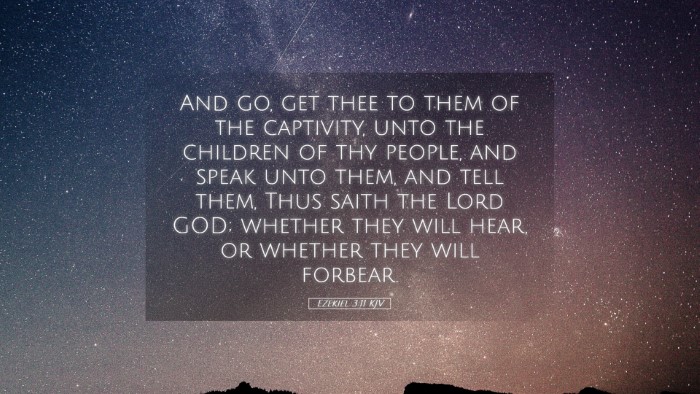Ezekiel 3:11 Commentary
Verse: Ezekiel 3:11
"And go, get thee to them of the captivity, unto the children of thy people, and speak unto them, and tell them, Thus saith the Lord GOD; whether they will hear, or whether they will forbear."
Introduction
This verse is fundamental in understanding Ezekiel's prophetic mission. The command from God to Ezekiel emphasizes the urgency and responsibility of proclaiming God's message to His people, especially the exiled Israelites. The context of the Babylonian captivity adds depth to this directive, highlighting the need for hope and repentance among the captives.
Historical Context
Ezekiel prophesied during a time of great turmoil for Israel. The Babylonian exile represented not just physical captivity but a spiritual crisis for the nation. Ezekiel’s ministry emerged to address these challenges, reinforcing God’s sovereignty and the possibility of restoration for a people in despair.
The Call to Action
In this verse, God instructs Ezekiel to go to the captives, indicating that the message is intended for those who have been forcibly removed from their land and traditions. This mission is multifold:
- Direct Communication: The necessity of direct engagement with the people, reflecting God's desire for a personal connection between Himself and His people.
- To Speak Authoritatively: The phrase "Thus saith the Lord GOD" signifies that Ezekiel is not merely sharing opinions or advice but delivering a divine mandate that should be heeded.
- Response Anticipation: The inclusion of "whether they will hear, or whether they will forbear" highlights the dual possibility of rejection or acceptance that the prophet must face.
The Role of the Prophet
Commentators emphasize Ezekiel’s role as a 'watchman' (see Ezekiel 3:17). His obedience to the divine command showcases the serious responsibility entrusted to prophets. Matthew Henry notes:
“It is the duty of a watchman to warn the people of approaching danger, and if they do not heed the warning, their blood is on their own heads.”
Spiritual Significance
Albert Barnes notes that the act of speaking to the captives is not merely about delivering a message but serves to awaken the people to their condition and the need for repentance. The spiritual implications are profound:
- Awareness of Sin: The call to communicate implies that the people must first recognize their alienation from God due to their actions.
- Hope for Restoration: Implicit in God’s command is the hope that these captives can return to Him and be restored, reflecting the overarching theme of redemption found throughout Scripture.
- Personal Responsibility: Each individual must be willing to respond to God's word, whether they choose to listen or reject it.
Theological Implications
This verse raises essential theological questions for scholars and students:
- The Nature of God’s Communication: How does God communicate His will to humanity? Is there an expectation for humans to be receptive?
- Human Agency: The balance between divine sovereignty and human choice is critical. People against divine truth, despite having the invitation to hear, raises discussions about free will.
- The Role of the Community: The emphasis on “children of thy people” acknowledges the communal responsibility within the faith community.
Application for the Church Today
The passage explicitly instructs modern-day disciples and leaders to recognize their roles as communicators of God's Truth. Some implications include:
- Proclamation: Ensuring that the Word of God is consistently proclaimed to those in spiritual captivity today—this could relate to issues like sin, despair, and ethical dilemmas in society.
- Engagement: Similar to Ezekiel, pastors must engage their congregations thoughtfully and lovingly, challenging them to respond to God’s call.
- Encouragement of Repentance: The church is called to preach repentance and the hope of restoration, encouraging members to return to God heartily.
Conclusion
In Ezekiel 3:11, we see a divine imperative that transcends time. The expectation of God’s people to heed His voice remains relevant for contemporary believers. As noted by Adam Clarke:
“The prophet's duty was to deliver the message regardless of the immediate outcome, trusting in God's ultimate plan for His people."
This verse serves as both a reminder and a challenge to all—pastors, theologians, and believers alike—to actively engage in the mission of sharing God’s message with those willing to listen and those who may reject it.


